|
|
|
Sort Order |
|
|
|
Items / Page
|
|
|
|
|
|
|
| Srl | Item |
| 1 |
ID:
130859
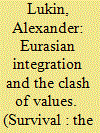

|
|
|
|
|
| Publication |
2014.
|
| Summary/Abstract |
Putin has now established an independent power centre in Eurasia. Although economic considerations are important, they are also secondary to a set of values differing from those preached by the West.
Since the Enlightenment, the driving concepts of Western civilisation have been the belief in its own superiority and the theory of linear progress in human society. According to this understanding, the West (firstly Europe, and later the United States) reached the highest and most advanced level of development, with all other countries moving along the same continuum, although lagging behind and located at various stages of proximity to this ideal.
In fact, many civilisations have considered themselves superior to others. The Ancient Greeks, Romans, medieval Chinese and many others all believed that they had reached the pinnacle of social development. However, the last few centuries of industrial success and military power have reinforced the theory of the West's superiority, with the result that Western notions of progress have long captured the thinking of most of the world.
|
|
|
|
|
|
|
|
|
|
|
|
|
|
|
|
| 2 |
ID:
124731
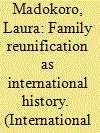

|
|
|
|
|
| Publication |
2013.
|
| Summary/Abstract |
Building on the emerging scholarship that treats the history of global migration as a crucial aspect of international history, this article examines the little known 1973 family reunification agreement between Canada and the People's Republic of China. The article contends that, despite its limitations, the agreement was an important milestone in the history of Sino-Canadian relations. Through a detailed micro-history, the article reveals the shifting political currents that led to the agreement's successful negotiation, highlighting how, by the early 1970s, Canada and other Western nations were embracing the notion of family reunification as an important human rights issue in the ongoing contests of the global Cold War.
|
|
|
|
|
|
|
|
|
|
|
|
|
|
|
|
| 3 |
ID:
124835
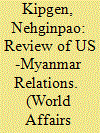

|
|
|
|
|
| Publication |
2013.
|
| Summary/Abstract |
The release of political prisoners by the Burmese government and the successful holding of by-elections were two major landmarks of 2012 that led to improvements in relations between US and Myanmar. The confirmation of Derek Mitchell as the new US Ambassador to Myanmar an the lifting of American investment sanctions followed by the suspension of import bans from the country were significant results of the improving relationship.
|
|
|
|
|
|
|
|
|
|
|
|
|
|
|
|
| 4 |
ID:
171049
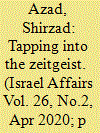

|
|
|
|
|
| Summary/Abstract |
Its close alliance with the West over the course of seven decades notwithstanding, Israel has embarked on an East-looking orientation during the past several years. Aiming to cultivate multifaceted connections to various Asian countries, the new Israeli approach has striven to enhance the Jewish state’s relationship with the East in the political, military, economic, financial, technological, and cultural spheres. For their part, many Asian states have displayed a keen desire to expand their growing interactions with Israel, smoothing the way for the success of Israel’s East-looking drive.
|
|
|
|
|
|
|
|
|
|
|
|
|
|
|
|
| 5 |
ID:
146853
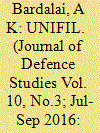

|
|
|
|
|
| Contents |
Nations from the developed world have rarely participated in complex and difficult UN peacekeeping operations (PKOs) while those from the developing world have rich peacekeeping experience. The United Nations Interim Force in Lebanon (UNIFIL) is a rare exception among peacekeeping missions as it includes peacekeepers from the North Atlantic Treaty Organization (NATO), along with Western military involvement. NATO members’ involvement in UNIFIL resulted in unusual structures and operational philosophy, and adjusting and adapting to this was difficult for non-Western participants. Despite the differences in training, equipment, culture and tradition amongst the Western and non-Western national contingents, UNIFIL’s contribution in maintaining peace in the region is praiseworthy. The combined effects of the political and military muscles of peacekeepers from Western nations and special skills of the non-Western nations was able to provide much-needed stability to Lebanon, which has not seen a major conflict in almost a decade.
|
|
|
|
|
|
|
|
|
|
|
|
|
|
|
|
|
|
|
|
|